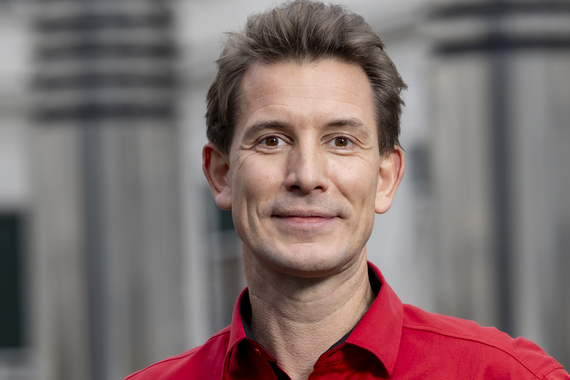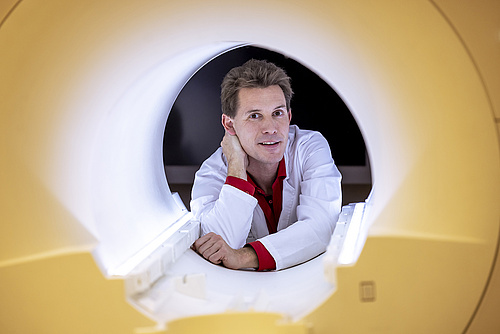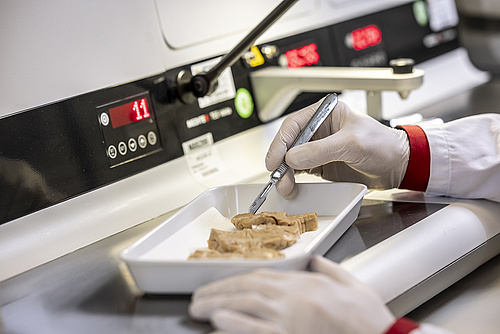- The University
- Studying
-
Research
- Profile
- Infrastructure
- Cooperations
- Services
-
Career
- Med Uni Graz as an Employer
- Educational Opportunities
- Work Environment
- Job openings
-
Diagnostics
- Patients
- Referring physicians
-
Health Topics
- Health Infrastructure

ERC Consolidator Grant for Christian Langkammer
Christian Langkammer from the Department of Neurology at the Medical University of Graz has been awarded an ERC Consolidator Grant—one of Europe’s most prestigious research funding programs, granted solely on the basis of scientific excellence. The €2 million funding will enable him to further expand his research group in the coming years. With this grant, he will realize the project "WhatsMRI – Elemental and Structural Composition underlying Brain MRI," which explores fundamental biophysical mechanisms underlying magnetic resonance imaging (MRI).
A closer look at the chemical and structural composition of the brain
Magnetic resonance imaging (MRI) is a clinically established technology, with more than 50,000 scanners worldwide and over 100 million diagnostic examinations performed annually. Christian Langkammer’s research at Med Uni Graz focuses on the myelin sheath—a protective and insulating layer surrounding nerve fibers. It plays a critical role in the rapid and efficient transmission of electrical impulses and is essential for motor, sensory, and cognitive functions. The myelin sheath consists of a specific arrangement of lipids and proteins, with its composition and structure being crucial to its function. Changes in myelin, such as occurring in neurological diseases like multiple sclerosis or during the process of healthy ageing, can be assessed using MRI. However, systematically validated insights into how chemical and structural variations influence quantitative MRI images are still lacking—a knowledge gap that will be addressed in his research.
An interdisciplinary approach: MRI and the microstructure of the brain
To better understand quantitative MRI measurements, Christian Langkammer is taking an unconventional approach: combining post-mortem MRI images of human brains with cutting-edge analytical methods such as laser-ablation mass spectrometry (for chemical analysis), synchrotron X-ray scattering (for studying material structures), and high-resolution microscopy techniques, alongside mathematical modeling and simulation. "The aim of this work is to create a detailed model linking microstructural (histological) properties of the brain to quantitaitive MRI parameters, and particularly to better understand and numerically describe pathological brain alterations in neurological diseases". Additionally to fundamental insights into the biophysical mechanisms of MRI, this project will also establish a publicly accessible chemical and structural atlas of the human brain—a valuable tool for research fields beyond MRI.
Andrea Kurz, Rector of Med Uni Graz, stated proudly: "Christian Langkammer is an innovative scientist whose research is recognized internationally. This ERC Consolidator Grant is not only a culmination of his scientific work but also a milestone for neuroscience at Med Uni Graz. We are proud to have such a creative and forward-thinking researcher on our team."
Christian Enzinger, Vice Rector for Research and International Relations, added: "The awarding of this prestigious grant to Christian Langkammer highlights the leading position of our university in neurosciences. The interdisciplinary approach of his project will open new avenues in imaging research. We fully support his work and, in collaboration with the other universities in Graz, will intensify our efforts to create ideal research infrastructure, including an ultra-high-field MRI scanner."
About the Awardee
Christian Langkammer is an Associate Professor at the Department of Neurology. His academic career includes a PhD from Graz University of Technology and an Erwin Schrödinger Fellowship at the Martinos Center of Harvard Medical School in Boston. His research focuses on quantitative magnetic resonance imaging (MRI), particularly brain iron mapping and the development of methods for quantitative susceptibility mapping (QSM).
About the ERC
The ERC, set up by the European Union in 2007, is the premier European funding organisation for excellent frontier research. It funds creative researchers of any nationality and age, to run projects based across Europe. The ERC offers four core grant schemes: Starting Grants, Consolidator Grants, Advanced Grants and Synergy Grants. With its additional Proof of Concept Grant scheme, the ERC helps grantees to bridge the gap between their pioneering research and early phases of its commercialisation. The ERC is led by an independent governing body, the Scientific Council. Since November 2021, Maria Leptin is the President of the ERC. The overall ERC budget from 2021 to 2027 is more than €16 billion, as part of the Horizon Europe programme. The European Commissioner for Startups, Research and Innovation Ekaterina Zaharieva is responsible for this programme from 1 December 2024.
Images: Helmut Lunghammer
Contact
Assoz. Prof. Priv.-Doz. Dipl.-Ing. Dr. techn.
Christian Langkammer
Christian Langkammer
Department of Neurology
Medical University of Graz
T: +43 316 385 13247




